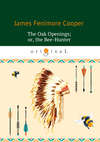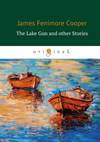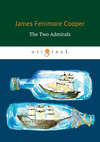Loe raamatut: «Mercedes of Castile: or, The Voyage to Cathay», lehekülg 14
High mass was said in the chapel of the convent, and Columbus received the consecrated bread from the hands of Fray Juan Perez, in humble reliance on the all-seeing providence of God, and with a devout dependence on his fostering protection. All who were about to embark with the admiral imitated his example, communing in his company; for that was a period when the wire-drawn conclusions of man had not yet begun so far to supplant the faith and practices of the earlier church as to consider its rites as the end of religion, but he was still content to regard them as its means. Many a rude sailor, whose ordinary life might not have been either saintly or even free from severe censure, knelt that day at the altar, in devout dependence on God, with feelings, for the moment, that at least placed him on the highway to grace; and it would be presumptuous to suppose that the omniscient Being to whom his offerings were made, did not regard his ignorance with commiseration, and even look upon his superstition with pity. We scoff at the prayers of those who are in danger, without reflecting that they are a homage to the power of God, and are apt to fancy that these passages in devotion are mere mockery, because the daily mind and the ordinary life are not always elevated to the same standard of godliness and purity. It would be more humble to remember the general infirmities of the race; to recollect, that as none are perfect, the question is reduced to one of degree; and to bear in mind, that the Being who reads the heart, may accept of any devout petitions, even though they come from those who are not disposed habitually to walk in his laws. These passing but pious emotions are the workings of the Spirit, since good can come from no other source; and it is as unreasonable as it is irreverent to imagine that the Deity will disregard, altogether, the effects of his own grace, however humble.
Whatever may have been the general disposition of most of the communicants on this occasion, there is little doubt that there knelt at the altar of la Rabida, that day, one in the person of the great navigator himself, who, as far as the eye could perceive, lived habitually in profound deference to the dogmas of religion, and who paid an undeviating respect to all its rites. Columbus was not strictly a devotee; but a quiet, deeply seated enthusiasm, which had taken the direction of Christianity, pervaded his moral system, and at all times disposed him to look up to the protecting hand of the Deity and to expect its aid. The high aims that he entertained for the future have already been mentioned, and there is little doubt of his having persuaded himself that he had been set apart by Providence as the instrument it designed to employ in making the great discovery on which his mind was so intently engaged, as well as in accomplishing other and ulterior purposes. If, indeed, an overruling Power directs all the events of this world, who will presume to say that this conviction of Columbus was erroneous, now that it has been justified by the result? That he felt this sentiment sustaining his courage and constantly urging him onward, is so much additional evidence in favor of his impression, since, under such circumstances, nothing is more probable than that an earnest belief in his destiny would be one of the means most likely to be employed by a supernatural power in inducing its human agent to accomplish the work for which he had actually been selected.
Let this be as it might, there is no doubt that Colon observed the rites of the church, on the occasion named, with a most devout reliance on the truth of his mission, and with the brightest hopes as to its successful termination. Not so, however, with all of his intended followers. Their minds had wavered, from time to time, as the preparations advanced; and the last month had seen them eager to depart, and dejected with misgivings and doubts. Although there were days of hope and brightness, despondency perhaps prevailed, and this so much the more because the apprehensions of mothers, wives, and of those who felt an equally tender interest in the mariners, though less inclined to avow it openly, were thrown into the scale by the side of their own distrust. Gold, unquestionably, was the great aim of their wishes, and there were moments when visions of inexhaustible mines and of oriental treasures floated before their imaginations; at which times none could be more eager to engage in the mysterious undertaking, or more ready to risk their lives and hopes on its success. But these were fleeting impressions, and, as has just been said, despondency was the prevalent feeling among those who were about to embark. It heightened the devotion of the communicants, and threw a gloom over the chastened sobriety of the altar, that weighed heavily on the hearts of most assembled there.
"Our people seem none of the most cheerful, Señor Almirante," said Luis, as they left the convent-chapel in company; "and, if truth must be spoken, one could wish to set forth on an expedition of this magnitude, better sustained by merry hearts and smiling countenances."
"Dost thou imagine, young count, that he hath the firmest mind who weareth the most smiling visage, or that the heart is weak because the countenance is sobered? These honest mariners bethink them of their sins, and no doubt are desirous that so holy an enterprise be not tainted by the corruption of their own hearts, but rather purified and rendered fitting, by their longings to obey the will of God. I trust, Luis" – intercourse had given Columbus a sort of paternal interest in the welfare of the young grandee, that lessened the distance made by rank between them – "I trust, Luis, thou art not, altogether, without these pious longings in thine own person."
"By San Pedro, my new patron! Señor Almirante, I think more of Mercedes de Valverde, than of aught else, in this great affair. She is my polar star, my religion, my Cathay. Go on, in Heaven's name, and discover what thou wilt, whether it be Cipango or the furthest Indies; beard the great Khan on his throne, and I will follow in thy train, with a poor lance and an indifferent sword, swearing that the maid of Castile hath no equal, and ransacking the east, merely to prove in the face of the universe that she is peerless, let her rivals come from what part of the earth they may."
Although Columbus permitted his grave countenance slightly to relax at this rhapsody, he did not the less deem it prudent to rebuke the spirit in which it was uttered.
"I grieve, my young friend," he said, "to find that thou hast not the feelings proper for one who is engaged, as it might be, in a work of Heaven's own ordering. Canst thou not foresee the long train of mighty and wonderful events that are likely to follow from this voyage – the spread of religion, through the holy church; the conquest of distant empires, with their submission to the sway of Castile; the settling of disputed points in science and philosophy, and the attainment of inexhaustible wealth; with the last and most honorable consequence of all, the recovery of the sepulchre of the Son of God, from the hands of the Infidels!"
"No doubt, Señor Colon – no doubt, I see them all, but I see the Doña Mercedes at their end. What care I for gold, who already possess – or shall so soon possess – more than I need? what is the extension of the sway of Castile to me, who can never be its king? and as for the Holy Sepulchre, give me but Mercedes, and, like my ancestors that are gone, I am ready to break a lance with the stoutest Infidel who ever wore a turban, be it in that, or in any other quarrel. In short, Señor Almirante, lead on; and though we go forth with different objects and different hopes, doubt not that they will lead us to the same goal. I feel that you ought to be supported in this great and noble design, and it matters not what may bring me in your train."
"Thou art a mad-brained youth, Luis, and must be humored, if it were only for the sake of the sweet and pious young maiden who seemeth to engross all thy thoughts."
"You have seen her, Señor, and can say whether she be not worthy to occupy the minds of all the youth of Spain?"
"She is fair, and virtuous, and noble, and a zealous friend of the voyage. These are all rare merits, and thou may'st be pardoned for thy enthusiasm in her behalf. But forget not, that, to win her, thou must first win a sight of Cathay."
"In the reality, you must mean, Señor Almirante; for, with the mind's eye, I see it keenly, constantly, and see little else, with Mercedes standing on its shores, smiling a welcome, and, by St. Paul! sometimes beckoning me on, with that smile that fires the soul with its witchery, even while it subdues the temper with its modesty. The blessed Maria send us a wind, right speedily, that we may quit this irksome river and wearying convent!"
Columbus made no answer; for, while he had all consideration for a lover's impatience, his thoughts turned to subjects too grave, to be long amused even by a lover's follies.
CHAPTER XIII
"Nor Zayda weeps him only,
But all that dwell between
The great Alhambra's palace walls
And springs of Albalein."
Bryant's Translations.
The instant of departure at length arrived. The moment so long desired by the Genoese was at hand, and years of poverty, neglect, and of procrastination, were all forgotten at that blessed hour; or, if they returned in any manner to the constant memory, it was no longer with the bitterness of hope deferred. The navigator, at last, saw himself in the possession of the means of achieving the first great object for which he had lived the last fifteen years, with the hope, in perspective, of making the success of his present adventure the stepping-stone toward effecting the conquest of the Holy Sepulchre. While those around him were looking with astonishment at the limited means with which ends so great were to be attained, or were struck aghast at the apparent temerity of an undertaking that seemed to defy the laws of nature, and to set at naught the rules of Providence, he had grown more tranquil as the time for sailing drew nearer, and his mind was oppressed merely by a feeling of intense, but of sobered, delight. Fray Juan Perez whispered to Luis, that he could best liken the joy of the admiral to the chastened rapture of a Christian who was about to quit a world of woe, to enter on the untasted, but certain, fruition of blessed immortality.
This, however, was far from being the state of mind of all in Palos. The embarkation took place in the course of the afternoon of the 2d of August, it being the intention of the pilots to carry the vessels that day to a point off the town of Huelvas, where the position was more favorable to making sail than when anchored in front of Palos. The distance was trifling, but it was the commencement of the voyage, and, to many, it was like snapping the cords of life, to make even this brief movement. Columbus, himself, was one of the last to embark, having a letter to send to the court, and other important duties to discharge. At length he quitted the convent, and, accompanied by Luis and the prior, he, too, took his way to the beach. The short journey was silent, for each of the party was deeply plunged in meditation. Never before this hour, did the enterprise seem so perilous and uncertain to the excellent Franciscan. Columbus was carefully recalling the details of his preparations, while Luis was thinking of the maid of Castile, as he was wont to term Mercedes, and of the many weary days that must elapse before he could hope to see her again.
The party stopped on the shore, in waiting for a boat to arrive, at a place where they were removed from any houses. There Fray Juan Perez took his leave of the two adventurers. The long silence that all three had maintained, was more impressive than any ordinary discourse could have been; but it was now necessary to break it. The prior was deeply affected, and it was some little time before he could even trust his voice to speak.
"Señor Christoval," he at length commenced, "it is now many years since thou first appeared at the gate of Santa Maria de Rabida – years of friendship and pleasure have they proved to me."
"It is full seven, Fray Juan Perez," returned Columbus – "seven weary years have they proved to me, as a solicitor for employment – years of satisfaction, father, in all that concerneth thee. Think not that I can ever forget the hour, when, leading Diego, houseless, impoverished, wanderers, journeying on foot, I stopped to tax the convent's charity for refreshment! The future is in the hands of God, but the past is imprinted here" – laying his hand on his heart – "and can never be forgotten. Thou hast been my constant friend, holy prior, and that, too, when it was no credit to favor the nameless Genoese. Should my estimation ever change in men's opinions" —
"Nay, Señor Almirante, it hath changed already," eagerly interrupted the prior. "Hast thou not the commission of the queen – the support of Don Fernando – the presence of this young noble, though still as an incognito – the wishes of all the learned? Dost thou not go forth, on this great voyage, carrying with thee more of our hopes than of our fears?"
"So far as thou art concerned, dear Juan Perez, this may be so. I feel that I have all thy best wishes for success; I know that I shall have thy prayers. Few in Spain, notwithstanding, will think of Colon with respect, or hope, while we are wandering on the great desert of the ocean, beyond a very narrow circle. I fear me, that, even at this moment, when the means of learning the truth of our theories is in actual possession – when we stand, as it might be, on the very threshold of the great portal which opens upon the Indies – that few believe in our chances of success."
"Thou hast Doña Isabella of thy side, Señor!"
"And Doña Mercedes!" put in Luis; "not to speak of my decided and true-hearted aunt!"
"I ask but a few brief months, Señores," returned Columbus, his face turned to heaven with uncovered head, his gray hair floating in the wind, and his eye kindling with the light of enthusiasm – "a few short months, that will pass away untold with the happy – that even the miserable may find supportable, but which to us will seem ages, must now dispose of this question. Prior, I have often quitted the shore feeling that I carried my life in my hand, conscious of all the dangers of the ocean, and as much expecting death as a happy return; but at this glorious moment no doubts beset me; as for life, I know it is in the keeping of God's care; as for success, I feel it is in God's wisdom!"
"These are comfortable sentiments, at so serious a moment, Señor, and I devoutly hope the end will justify them. But, yonder is thy boat, and we must now part. Señor, my son, thou knowest that my spirit will be with thee in this mighty undertaking."
"Holy prior, remember me in thy prayers. I am weak, and have need of this support. I trust much to the efficacy of thy intercessions, aided by those of thy pious brotherhood. Thou wilt bestow on us a few masses?"
"Doubt us not, my friend; all that la Rabida can do with the blessed Virgin, or the saints, shall be exercised, without ceasing, in thy behalf. It is not given to man to foresee the events that are controlled by Providence; and, though we deem this enterprise of thine so certain, and so reasonable, it may nevertheless fail."
"It may not fail, father; God hath thus far directed it, and he will not permit it to fail."
"We know not, Señor Colon; our wisdom is but as a grain of mustard seed among the sands of this shore, as compared with his inscrutable designs. I was about to say, as it is possible thou may'st return a disappointed, a defeated man, that thou wilt still find the gate of Santa Maria open to thee; since, in our eyes, it is as meritorious to attempt nobly, as it is often, in the eyes of others, to achieve successfully."
"I understand thee, holy prior; and the cup and the morsel bestowed on the young Diego, were not more grateful than this proof of thy friendship! I would not depart without thy blessing."
"Kneel, then, Señor; for, in this act it will not be Juan Perez de Marchena that will speak, and pronounce, but the minister of God and the church. Even these sands will be no unworthy spot to receive such an advantage."
The eyes of both Columbus and the prior were suffused with tears, for at that moment the heart of each was touched with the emotions natural to a moment so solemn. The first loved the last, because he had proved himself a friend when friends were few and timid; and the worthy monk had some such attachment for the great navigator as men are apt to feel for those they have cherished. Each, also, respected and appreciated the other's motives, and there was a bond of union in their common reverence for the Christian religion. Columbus kneeled on the sands, and received the benediction of his friend, with the meek submission of faith, and with some such feelings of reverence as those with which a pious son would have listened to a blessing pronounced by a natural father.
"And thou, young lord," resumed Fray Juan Perez, with a husky voice – "thou, too, wilt be none the worse for the prayers of an aged churchman."
Like most of that age, Luis, in the midst of his impetuous feelings, and youthful propensities, had enshrined in his heart an image of the Son of God, and entertained an habitual respect for holy things. He knelt without hesitation, and listened to the trembling words of the priest with thankfulness and respect.
"Adieu, holy prior," said Columbus, squeezing his friend's hand. "Thou hast befriended me when others held aloof; but I trust in God that the day is not now distant, when those who have ever shown confidence in my predictions will cease to feel uneasiness at the mention of my name. Forget us in all things but thy prayers, for a few short months, and then expect tidings that, of a verity, shall exalt Castile to a point of renown which will render this Conquest of Granada but an incident of passing interest amid the glory of the reign of Ferdinand and Isabella!"
This was not said boastfully, but with the quiet earnestness of one who saw a truth that was concealed from most eyes, and this with an intensity so great, that the effect on his moral vision produced a confidence equalling that which is the fruit of the evidence of the senses in ordinary men. The prior understood him, and the assurance thus given cheered the mind of the worthy Franciscan long after the departure of his friend. They embraced and separated.
By this time the boat of Columbus had reached the shore. As the navigator moved slowly toward it, a youthful female rushed wildly past him and Luis, and, regardless of their presence, she threw her arms around a young mariner who had quitted the boat to meet her, and sobbed for a minute on his bosom, in uncontrollable agony, or as women weep in the first outbreak of their emotions.
"Come, then, Pepe," the young wife at length said, hurriedly, and with low earnestness, as one speaks who would fain persuade herself that denial was impossible – "come, Pepe; thy boy hath wept for thee, and thou hast pushed this matter, already, much too far."
"Nay, Monica," returned the husband, glancing his eye at Columbus, who was already near enough to hear his words – "thou knowest it is by no wish of mine that I am to sail on this unknown voyage. Gladly would I abandon it, but the orders of the queen are too strong for a poor mariner like me, and they must be obeyed."
"This is foolish, Pepe," returned the woman, pulling at her husband's doublet to drag him from the water-side – "I have had enough of this; sufficient to break my heart. Come, then, and look again upon thy boy."
"Thou dost not see that the admiral is near, Monica, and we are showing him disrespect."
The habitual deference that was paid by the low to the high, induced the woman, for a moment, to pause. She looked imploringly at Columbus, her fine dark eyes became eloquent with the feelings of a wife and mother, and then she addressed the great navigator, himself.
"Señor," she said, eagerly, "you can have no further need of Pepe. He hath helped to carry your vessels to Huelva, and now his wife and boy call for him at home."
Columbus was touched with the manner of the woman, which was not entirely without a show of that wavering of reason which is apt to accompany excessive grief, and he answered her less strongly than, at a moment so critical, he might otherwise have been disposed to do to one who was inciting to disobedience.
"Thy husband is honored in being chosen to be my companion in the great voyage," he said. "Instead of bewailing his fate, thou wouldst act more like a brave mariner's wife, in exulting in his good fortune."
"Believe him not, Pepe. He speaketh under the Evil One's advice to tempt thee to destruction. He hath talked blasphemy, and belied the word of God, by saying that the world is round, and that one may sail east by steering west, that he might ruin thee and others, by tempting ye all to follow him!"
"And why should I do this, good woman?" demanded the admiral. "What have I to gain by the destruction of thy husband, or by the destruction of any of his comrades?"
"I know not – I care not – Pepe is all to me, and he shall not go with you on this mad and wicked voyage. No good can come of a journey that is begun by belying the truths of God!"
"And what particular evil dost thou dread, in this, more than in another voyage, that thou thus hang'st upon thy husband, and usest such discourse to one who beareth their Highnesses' authority for that he doeth? Thou knewest he was a mariner when thou wert wedded, and yet thou wouldst fain prevent him from serving the queen, as becometh his station and duty."
"He may go against the Moor, or the Portuguese, or the people of Inghleterra, but I would not that he voyage in the service of the Prince of Darkness. Why tell us that the earth is round, Señor, when our eyes show that it is flat? And if round, how can a vessel that hath descended the side of the earth for days, ever return? The sea doth not flow upward, neither can a caravel mount the waterfall. And when thou hast wandered about for months in the vacant ocean, in what manner wilt thou, and those with thee, ever discover the direction that must be taken to return whence ye all sailed? Oh! Señor, Palos is but a little town, and once lost sight of in such a confusion of ideas, it will never be regained."
"Idle and childish as this may seem," observed Columbus, turning quietly to Luis, "it is as reasonable as much that I have been doomed to hear from the learned, during the last sixteen years. When the night of ignorance obscures the mind, the thoughts conjure arguments a thousand times more vain and frivolous than the phenomena of nature that it fancies so unreasonable. I will try the effect of religion on this woman, converting her present feelings on that head, from an enemy into an ally. Monica," calling her kindly and familiarly by name, "art thou a Christian?"
"Blessed Maria! Señor Almirante, what else should I be? Dost think Pepe would have married a Moorish girl?"
"Listen, then, to me, and learn how unlike a believer thou conductest. The Moor is not the only infidel, but this earth groaneth with the burden of their numbers, and of their sins. The sands on this shore are not as numerous as the unbelievers in the single kingdom of Cathay; for, as yet, God hath allotted but a small portion of the earth to those who have faith in the mediation of his Son. Even the sepulchre of Christ is yet retained by infidel hands."
"This have I heard, Señor; and 'tis a thousand pities the faith is so weak in those who have vowed to obey the law, that so crying an evil hath never been cured!"
"Hast thou not been told that such is to be the fate of the world, for a time, but that light will dawn when the word shall pass, like the sound of trumpets, into the ears of infidels, and when the earth, itself, shall be but one vast temple, filled with the praises of God, the love of his name, and obedience to his will?"
"Señor, the good fathers of la Rabida, and our own parish priests, often comfort us with these hopes."
"And hast thou seen naught of late to encourage that hope – to cause thee to think that God is mindful of his people, and that new light is beginning to burst on the darkness of Spain?"
"Pepe, his excellency must mean the late miracle at the convent, where they say that real tears were seen to fall from the eyes of the image of the holy Maria, as she gazed at the child that lay on her bosom."
"I mean not that," interrupted Columbus, a little sternly, though he crossed himself, even while he betrayed dissatisfaction at the allusion to a miracle that was much too vulgar for his manly understanding – "I mean no such questionable wonder, which it is permitted us to believe, or not, as it may be supported by the church's authority. Can thy faith and zeal point to no success of the two sovereigns, in which the power of God, as exercised to the advancement of the faith, hath been made signally apparent to believers?"
"He meaneth the expulsion of the Moor, Pepe!" the woman exclaimed, glancing quickly toward her husband, with a look of pleasure, "that hath happened of late, they say, by conquering the city of Granada; into which place, they tell me, Doña Isabella hath marched in triumph."
"In that conquest, thou seest the commencement of the great acts of our time. Granada hath now its churches; and the distant land of Cathay will shortly follow her example. These are the doings of the Lord, foolish woman; and in holding back thy husband from this great undertaking, thou hinderest him from purchasing a signal reward in heaven, and may unwittingly be the instrument of casting a curse, instead of a blessing, on that very boy, whose image now filleth thy thoughts more than that of his Maker and Redeemer."
The woman appeared bewildered, first looking at the admiral, and then at her husband, after which she bowed her head low, and devoutly crossed herself. Recovering from this self-abasement, she again turned toward Columbus, demanding earnestly —
"And you, Señor – do you sail with the wish and hope of serving God?"
"Such is my principal aim, good woman. I call on Heaven itself, to witness the truth of what I say. May my voyage prosper, only, as I tell thee naught but truth!"
"And you, too, Señor?" turning quickly to Luis de Bobadilla; "is it to serve God that you also go on this unusual voyage?"
"If not at the orders of God, himself, my good woman, it is, at least, at the bidding of an angel!"
"Dost thou think it is so, Pepe? Have we been thus deceived, and has so much evil been said of the admiral and his motives, wrongfully?"
"What hath been said?" quietly demanded Columbus. "Speak freely; thou hast naught to dread from my displeasure."
"Señor, you have your enemies, as well as another, and the wives, and mothers, and the betrothed of Palos, have not been slow to give vent to their feelings. In the first place, they say that you are poor."
"That is so true and manifest, good woman, it would be idle to deny it. Is poverty a crime at Palos?"
"The poor are little respected, Señor, in all this region. I know not why, for to me we seem to be as the rest, but few respect us. Then they say, Señor, that you are not a Castilian, but a Genoese."
"This is also true; is that, too, a crime among the mariners of Moguer, who ought to prize a people as much renowned for their deeds on the sea, as those of the superb republic?"
"I know not, Señor; but many hold it to be a disadvantage not to belong to Spain, and particularly to Castile, which is the country of Doña Isabella, herself; and how can it be as honorable to be a Genoese as to be a Spaniard? I should like it better were Pepe to sail with one who is a Spaniard, and that, too, of Palos or Moguer."
"Thy argument is ingenious, if not conclusive," returned Columbus, smiling, the only outward exhibition of feeling he betrayed – "but cannot one who is both poor and a Genoese serve God?"
"No doubt, Señor; and I think better of this voyage since I know your motive, and since I have seen you and spoken with you. Still, it is a great sacrifice for a young wife to let her husband sail on an expedition so distrusted, and he the father of her only boy!"
"Here is a young noble, an only son, a lover, and that, too, of impetuous feelings, an only child withal, rich, honored, and able to go whither he will, who not only embarketh with me, but embarketh by the consent – nay, I had better say, by the orders of his mistress!"
"Is this so, Señor?" the wife asked, eagerly.
"So true, my good woman, that my greatest hopes depend on this voyage. Did I not tell thee that I went at the bidding of an angel?"
"Ah! these young lords have seductive tongues! But, Señor Almirante, since such is your quality, they say, moreover, that to you this voyage can only bring honors and good, while it may bring misery and death on your followers. Poor and unknown, it maketh you a high officer of the queen; and some think that the Venetian galleys will be none the more heavily freighted, should you need them on the high seas."
"And in what can all this harm thy husband? I go whithersoever he goeth, share his dangers, and expose life for life with him. If there is gold gained by the adventure, he will not be forgotten; and if heaven is made any nearer to us, by our dangers and hardships, Pepe will not be a loser. At the last great reckoning, woman, we shall not be asked who is poor, or who is a Genoese."
"This is true, Señor; and yet it is hard for a young wife to part from her husband. Dost thou wish, in truth, to sail with the admiral, Pepe?"
"It matters little with me, Monica; I am commanded to serve the queen, and we mariners have no right to question her authority. Now I have heard his excellency's discourse, I think less of the affair than before."




















